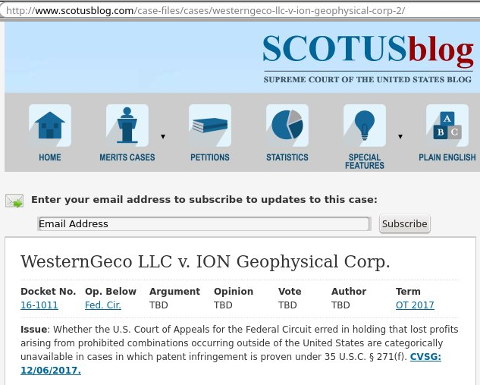

WHILE we're generally not particularly interested in the outcome of the WesternGeco case (WesternGeco v Ion), it's still useful to observe because it can shed light on the Justices' views on patents. We're mostly interested in cases that pertain to patent scope (this directly affects USPTO guidelines), not so-called 'damages'.
"The only upside we see here is that it weakens or shatters any illusions about SCOTUS being biased or lacking credibility."We first saw Jason Rantanen's fast response to it. Watchtroll wrote a couple of 'articles' about this outcome, amplifying himself and the other patent extremists (i.e. the usual recipe).
The EFF's Daniel Nazer called it a "disappointing opinion," as the court ended up ruling for patent maximalism, for a change.
To quote:
The Supreme Court issued a disappointing opinion [PDF] today holding that a company could recover patent damages for lost profits overseas. The court’s reasoning could make overseas damages available in many patent cases. This will disadvantage companies that do research and development in the United States. When patent law discourages domestic innovation, it achieves the opposite of its intended purpose.
The case, called WesternGeco LLC v. ION Geophysical Corp., involved a patent on a method of conducting marine seismic surveys. ION exported components that, when combined, were used to infringe the patent overseas. Under Section 271(f) of the Patent Act, exporting components of a patented invention for assembly abroad is considered infringement. WesternGeco received damages for the U.S. sales of the components. The court considered whether WesternGeco could also receive damages for lost profits for the use of the invention overseas.
The U.S. Supreme Court ruled on Friday that companies can recover profits lost because of the unauthorized use of their patented technology abroad in a victory for Schlumberger NV, the world’s largest oilfield services provider.
[...]
Internet-based companies and others had expressed concern that extending patent damages beyond national borders would expose U.S. high-technology firms to greater patent-related risks abroad.